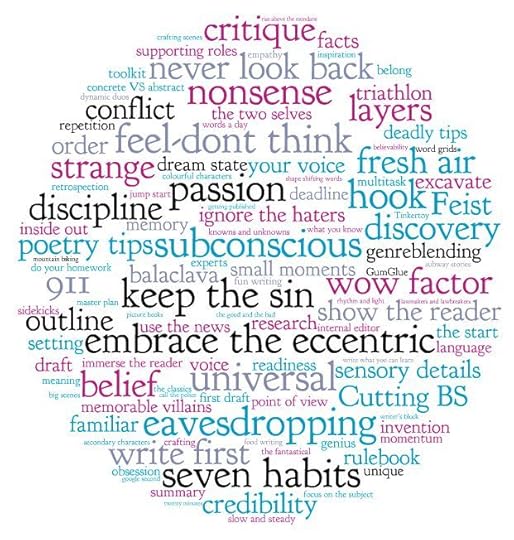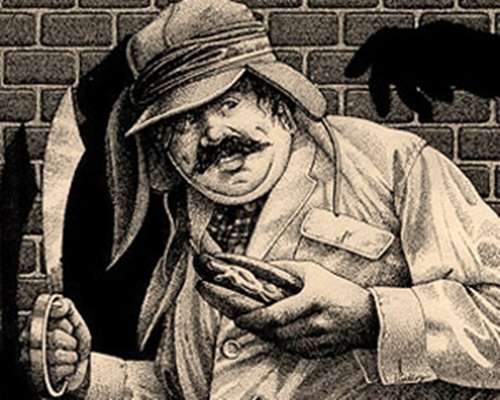Richard Harris's Blog, page 53
October 31, 2015
Reading Is Good. Period.
To be, or not to be, that is not the question. For bibliophiles today, Hamlet’s famous soliloquy has become:
To read or not to read, that is the question:
Whether ’tis Nobler in mind to suffer
The Slings and Arrows of an ebook,
Or to take Arms in the comfort of a physical book.
For me, the issue has become deeply personal – and vexing. Although the Huffington Post recently offered 11 Simple Reasons The Print Book Naysayers Are Wrong, it’s a little more complicated than that for authors. You see, as someone who earns royalties on the sale of both versions, I get, on average, approximately 10 percent of the list price from online sales and a figure slightly higher from bookstore sales. With the Kindle version of A Father’s Son, I earn 70 percent of the list price. It logically follows that as a writer, you might reasonably expect me to be a champion of ebooks.
Oddly enough, I’m quite the opposite. I’m an ardent supporter of the physical book no matter how cumbersome it may be to lug around and despite the fact that it’s more expensive to purchase. A world without brick-and-mortar bookstores is like a world without laughter emanating from parks and playgrounds; blooming flowers devoid of any fragrance; Band of Brothers minus Damian Lewis, damn it!
In any event, the long of the bottom line of the short is that reading in any medium is a good thing. Period. Bar none. End of conversation. Book clubs are way sexy. A History of Reading is a fantastic book. Chewing the fat about one’s favourite novels and all-time best characters is a good, good time.
That being said, should you wish to buy the ebook version of my novel, I will NOT – in way, shape or form – hold it against you. Ever. Period.


October 30, 2015
100 Tips to Make You a Better Writer + CBC Short Story Contest
CBC has some advice to offer you. Actually, 100 people have some suggestions on how to be a better writer through a very cool, very engaging “word cloud.”
As the CBC’s Books page states:
Over the last two years, Canada Writes has collected a whole bunch of wonderful writing tips from Canadian poets, novelists, practitioners of creative nonfiction, and writers of children’s books. So pick a word, find a tip, and try it out!
Click here to check out the innovative new tool and get readin’ (then writin’)!
Plus, for all aspiring and established writers out there, don’t forget to enter the 2016 CBC Short Story Contest in any or all of the following three categories: fiction (1,200-1,500 words), creative nonfiction (1,200-1,500 words) and/or poetry (400-600 words; in verse of prose). You can submit as many entires as you like online ($25 per submission), but the deadline is 11:59 p.m. EST on Sunday, November 1, 2015.


October 29, 2015
Canada Reads 2015: The Political Edition
My good friend and fellow non-curler extraordinaire Karen S. posted a thought-provoking article/diagram from The New York Times that matched current political candidates for the White House with the book which best represents them. Never one to shy away from having fun with books, I thought I’d take up her non-verbalized challenge to do the same with our most recent federal candidates for PM. (I would have said “political candidates for 24 Sussex Drive,” but it’s now our country’s unofficial ghost house for Halloween.)
So, without further ado, I bring you Canada Reads 2015: The Political Edition.
(In pictorial order)
Stephen Harper: The Prince (Niccolò Machiavelli) meets How to Fail: The Self-Hurt Guide (Aaron Goldfarb)
Tom Mulcair: King, Warrior, Magician, Lover: Rediscovering the Archetypes of the Mature Masculine (Robert Moore & Douglas Gillette) meets Manifesting Change: It Couldn’t Be Easier (Mike Dooley)
Justin Trudeau: Dude, Where’s My Country? (Michael Moore) meets The Hitchhiker’s Guide to the Galaxy (Douglas Adams)
[Honourable mention to Budding Prospects: A Pastoral by T. Coraghessan Boyle and The Men’s Hair Book: A Male’s Guide To Hair Care, Hair Styles, Hair Grooming, Hair Products and Rocking It All Without The Baloney by Rogelio Samson]
Gilles Duceppe: What Looks Like Crazy On an Ordinary Day (Pearl Cleage) meets Why Won’t They Listen To Me? (Dr. Janet Lapp)
Elizabeth May: The Fate of Nature: Rediscovering Our Ability to Rescue the Earth (Charles Wohlforth) meets Lioness Arising: Wake Up and Change Your World (Lisa Bevere)


October 28, 2015
When One Is Enough (Not Eight)
Bueller? Bueller? Frye? Frye? (Ed. Note: Was I the only person to say WTF in that scene when, in a big public high school class, there were exactly zero students with a last name between BU and FR?)
In a recent article on the good ol’ Onion’s website, they definitely touched a nerve in yours truly with “Author Promoting Book Gives It Her All,” which made me laugh and cry in turns. It may have been a piece of satirical writing, but it hit a little too close to home for many of us bums from the slums who call the trenches of literary warfare home. Or, for that matter, anyone who has given a speech or delivered a lecture to a public audience, only to find that if friends and family don’t qualify as “public” then you have exactly no guests at your event.
Ouch!
For me, I’ll never forget my first book signing in the spring of 2003, an event in which 20-25 of my closest friends and enemies showed up, some with blank cheques, others with dazzling stilettos – and not on their feet. At the end of the evening, a friend who’d been (wo)manning the book sale desk came up to me and said, rather sheepishly, “You sold seven copies of your book tonight. I’m really, really sorry.”
I was able to do the math quite quickly because I am a math rock/superstar (if 20 people were to buy one copy each, then I would have sold how many books?) and then came to the conclusion that my frienemies were inherently evil people.
Or maybe not. Maybe it’s just the nature of the beast. Maybe it’s okay when your worst book signing event is the one in which your closest friends attend. Perhaps it’s fine when nobody but former students show up to your public speaking engagement. And possibly – very possibly – the one in “one is enough” is sufficient when that person is you, you love what you do, and you’re not doing it for any other reason than the purpose at hand. Not for greed or revenge or fame or to score that wicked hot babe sitting in the front row and who is most certainly bedazzled with your good looks, panache and your excellent sense of style, as evidenced by the top-tier palazzo wide-leg rayon gaucho capri pants you’re wearing.
Nope.
You’re doing the event because you believe in yourself, and if those chairs remain empty, screw ’em all. You’re a mobile party of one, not five, and you don’t need no one to make you feel good ’bout what you’re doing. No way, Jose. You don’t even need a hug to feel better.
‘Cause you got your mom for that when you return home to the basement apartment you rent out from her.


October 27, 2015
Hope for the Best, Expect the Worst: The Legend of A Confederacy of Dunces
I like this piece by Oakland, California literary agent Andy Ross entitled “My Stern Lecture to a Client” for two reasons. First, it dispels the myth that once you sign with an agent it’s all sunshine and rainbows. It’s not, says Mr. Ross. It’s a still a crapshoot. Hedge your bets and remember his sage wisdom: Once the manuscript goes out to a publisher, hope for the best, but expect the worst. Shit happens. Life can fall apart in the blink of an eye. Fortunes can change for the stupidest reasons. Books get published every day by authors who’ve had a lobotomy and can’t spell their name correctly. Alternatively, books don’t get published every day even though they’re works of art that could electrify entire nations.
Then there’s the money, advances to authors for the publication of the physical and electronic book versions and the optioning of rights for movie purposes. How much will this be? asks the excited author to his or her agent. Who the hell knows? Can you predict the temperature in your city exactly 576 days from now to within a few degrees? As Mr. Ross says to clients about this issue, “I’m an agent, and I don’t have secret alchemical wisdom. I can’t turn lead into gold.”
Maybe he should read The Alchemist? Who knows. Not I, says I.
And there’s no better legend about this whole racket going on in the publishing worlds of New York and London (and Toronto, New Delhi, Sydney and Auckland to a lesser degree) than the story of John Kennedy Toole, author of the Pulitzer Prize-winning novel A Confederacy of Dunces and the inspiration behind my own short story, A Novel Idea.
Toole finished his now famous/infamous second novel in 1963. Upon his return to New Orleans from Puerto Rico, where he’d recently been discharged from the U.S. Army, Toole began editing his manuscript. Eventually, however, he gave up on finishing his pièce de résistance as he succumbed more and more to his mental illness. By 1969, Toole would be dead, a 31-year-old English professor who had driven out to the middle of nowhere, stuck a garden hose in his exhaust pipe, and fallen asleep in the driver’s side seat, never to wake up again.
An only child, Toole’s mother Thelma was devastated. It wasn’t until 1972, however, that Thelma Toole found a carbon copy of the final draft of her son’s book and began the excruciating process of trying to get it published. She failed the first time. And the second. And again and again, ad nauseam. For seven straight years she failed. Nobody would listen to her pleas until a college instructor in New Orleans named Walker Percy gave her the time of day. As he later put it:
…the lady was persistent, and it somehow came to pass that she stood in my office handing me the hefty manuscript. There was no getting out of it; only one hope remained—that I could read a few pages and that they would be bad enough for me, in good conscience, to read no farther. Usually I can do just that. Indeed the first paragraph often suffices. My only fear was that this one might not be bad enough, or might be just good enough, so that I would have to keep reading.
In this case I read on. And on. First with the sinking feeling that it was not bad enough to quit, then with a prickle of interest, then a growing excitement, and finally an incredulity: surely it was not possible that it was so good
In 1980, Louisiana State University published a limited print run (500 copies) of John Kennedy Toole’s now-beloved novel at Walker’s behest. A year later, it would become the third – and most recent – posthumous winner of a Pulitzer Prize for Fiction. It’s since been published in 22 languages and is now in its 30th edition.
The lesson here is clear. You may have to kill yourself to get published. You may have to relinquish the idea that you’ll be able to enjoy any material success or emotional fulfillment in this lifetime for the sake of literary posterity. But if you have a dedicated mom who’s got time on her hands, you might just win the Pulitzer.
Hope for the best, expect the worst. Amen.


October 26, 2015
The Great Canadian Novel…eh?
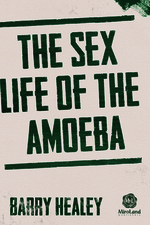
I know what you’re thinking: The Sex Life of the Amoeba is obviously a favourite of most pre-juvenile detention boys and girls and current Super Max facility residents, but is it the Great Canadian Novel? Let’s read the blurb on the back cover, shall we?
A novel about passions — a passion for sex, a passion for America, and a passion for movie-making. Sarah Fielding wants to turn the great Canadian novel into a ‘quality’ movie, but the sex-mad producer, the deluded Hollywood star, and the ‘authentic’ young actor have their own thoughts about how it should unfold. Will Sarah triumph? Not likely.
Riveting? Very much so. Salaciously scandalous? Is the bear Catholic? Does the Pope poop in the woods? ‘Nough said.
A couple of months ago, CBC published a list of 12 books it thought should be taught in high schools (but presumably were not being taught at many/most high schools). The list included some big names and heavyweight titles such as William Gibson’s Neuromancer, Lawrence Hill’s The Book of Negroes (otherwise known as Someone Knows My Name, as it was published in the U.S., Australia and New Zealand…what’s wrong with you, Yanks, Wallabies and Kiwis!), Douglas Coupland’s Generation X, and Thomas King’s The Inconvenient Indian.
Taking this one step further, I asked my book club colleagues and fellow curlers not long ago if they could think of The Great Canadian Novel. While we came up with some of the usual suspects (Alias Grace, In the Skin of a Lion, Barney’s Version, Fifth Business, Sunshine Sketches of a Little Town, Lives of Girls and Women), there was no unanimous agreement as to The Great Canadian Novel.
So, in the spirit of the literary awards season now upon us, I want to open this up to visitors to my site. What in your esteemed opinion is The Great Canadian Novel? Cast your vote by emailing me at harrisrh@gmail.com. I’ll announce the winner on November 1.


October 24, 2015
Good-bye, Boys of Summer (And Other Conspiracy Theories)
For Jays fans, the picture pretty much says it all.
Last night, Dorothy did NOT make it out of Kansas alive. She got swept away in a technicolour tornado and will not have the opportunity to look back until next spring in Dunedin, Florida. Amen.
Fair-weather fans will, I’m sure, lament our lot in life as Torontonians, the hardship of having to live in the same city as the Maple Leafs, etc., but I’m proud of our Boys in Blue and want to thank them for making the last few months more exciting for sports fans here in the Dot than I can remember in almost a generation. You played hard, you gave it your all, you kicked some serious ass along the way, and in the end you took it on the chin with dignity. In that way, perhaps I just misspoke. It’s not just Toronto you made proud; from Victoria to St. John’s, I’ve seen and heard friends calling, texting, emailing and Facebooking each other about the Jays, especially during their playoff drive. So, without dragging this out any further and turning it into a waterworks celebration, thank you members of the Toronto Blue Jays and its organization for being wicked awesome. You did good, boys.
Now, for those who not only enjoy America’s pastime the sport “not a lot of Canadians grew up playing [so] they’re not used to catching balls in the stands” but its accompanying literature as well, I thought I would suggest a couple of options if you’d like to keep the baseball season going, if only cerebrally. For me, Philip Roth’s The Great American Novel is by far and away the greatest piece of baseball-oriented fiction out there (and will make you pee your pants it’s so funny). In more recent years, Chad Harbach’s The Art of Fielding has got a lot of good press, much of it exaggerated in my humble opinion. Other enjoyable works include Bernard Malamud’s The Natural (with a totally different ending than the Robert Redford/Wonder Boy movie of the same name) and W.P. Kinsella’s Shoeless Joe (a much more multi-layered novel than the adapted screenplay, Field of Dreams). A couple of other notable books are Michael Chabon’s Summerland and Jennifer E. Smith’s The Comeback Season.
As for the other part of the title to this post, there seemed to be no more controversial buzzword in this series between Toronto and KC than “conspiracy.” From questionable calls behind the plate to Fox News “mistakenly” saying the World Series would start next Tuesday between KC and the Mets when the KC/Jays games was still in the 7th inning of game 6 to an Amish punk (seriously, he looked like one of those guys from the TLC show, right?) who went on national television and described how he caught a ball off the bat of Mike Moustakas “above the wall” when video evidence clearly shows he dipped his glove below the line, committed fan interference, and turned what should have been a ground rule double into a 2-0 lead for the Royals.
No comment from here on those calls, but I will offer a list of some top-notch conspiracy theory fiction. It obviously goes without saying that author, philanthropist, and Nobel nominee R.H. Harris’s Conspiracy is a classic in the genre. However, there are also some inferior works which are quite good, including Umberto Eco’s Foucault’s Pendulum (and one of the most challenging books I’ve ever sunk my literary teeth into), Orwell’s Nineteen Eighty-Four, Philip K Dick’s The Man in the High Castle, and Thomas Pynchon’s The Crying of Lot 49. Some also put David Foster Wallace’s Infinite Jest and Graham Greene’s Our Man in Havana up there. And while Dan Brown has now become the mostest bestsellingest author of all-time when it comes to conspiracy theories, I can’t say I’m a big fan of his, though I have to admit that I was pretty impressed with the research he carried out (i.e. the backbreaking work his minions did) for his latest novel, Inferno.
Anyway, this posted started on baseball and will end on the same note. We as Torontonians often walk that fine line between self-deprecation and self-loathing, but thanks to the Jays this autumn, we can all hold our heads high and be proud that at least one of our myriad sports organizations got it right. You won’t soon be forgotten, boys…


October 19, 2015
Jonathan Franzen, A Federal Prison & A Reader’s Manifesto
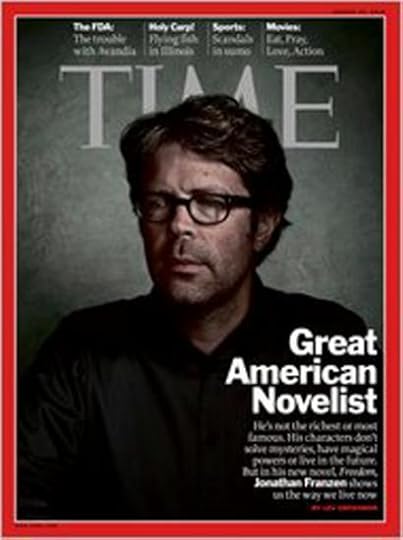 +
+
 +
+
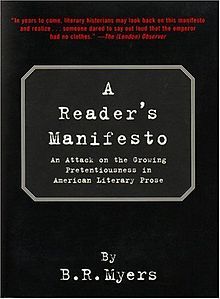 = ?
= ?If you like playing Six Degrees of Kevin Bacon n’ Eggs, I tempt you to connect the dots of this post’s title before reading on any further.
In an article released online by The Intercept, a site “dedicated to producing fearless, adversial journalism,” federal prison inmate Barrett Brown penned an article titled “Stop Sending Me Jonathan Franzen Novels.”
Mr. Brown is an imprisoned American journalist and founder of Project PM, “a crowd-sourced investigation into the cyber-industrial complex.” In 2012 he was sentenced to 63 months in prison after the FBI raided his house and indicted him on 12 federal charges.
In the October 6 piece mentioned above, Mr. Brown does a convincing job of demystifying what in recent years has become the cult of Jonathan Franzen, author of notable works such as The Corrections and Freedom. His latest novel is called Purity.
As you might glean from the title of his review, Barrett Brown is not a card-carrying member of the J. Franzen Party. He actually starts his review of Purity by quoting Los Angeles Times book critic David Ulin, who describes Franzen as follows:
By now, Franzen is often regarded less as writer than as cultural signifier, emblem of white male hegemony. That this has little if anything to do with the substance of his novels is (perhaps) the point and the tragedy; when it comes to Franzen, the writing is where we go last.
When Mr. Brown gets to the subject at hand himself, this is what he had to say in a nutshell:
Purity isn’t a terrible book or even a very bad one. There is some clever use of language once in a while, yet Franzen resists the temptation to dip into the self-conscious attempts at “literary” phrasing that mark so much of his competition…Characters will sometimes think clever thoughts or even say them out loud, but not so often that this becomes unseemly. Now and again we are even presented with snippets of real insight. One can see how Franzen could have written a much better book 15 years ago.
Mr. Brown then goes on to Franzen’s interpretation of the state of fiction today through the author’s 1996 Harper’s essay, “Perchance to Dream,” and summarily tears down that Berlin Wall of triteness when he says that people would be better served to read a piece from an old friend of mine from my Korea days, B.R. Myers, who penned a scandalous (well, as scandalous as the publishing world gets when it’s not centred around such cerebral topics as how many hues of grey exist and can a million little pieces really be one big piece of hyped-up poppycock?) article that appeared in the July/August 2001 issue of The Atlantic called “A Reader’s Manifesto: An attack on the growing pretentiousness of American literary prose” (and would be published a year later as a book).
Barrett Brown winds down his own piece on Franzen and Purity with this rather, er, direct commentary:
Let me put it this way. I was interested enough in WikiLeaks, state transparency, and emergent opposition networks to do five years in prison over such things, but I wasn’t interested enough that I would have voluntarily plowed through 500 pages of badly plotted failed-marriage razzmatazz by an author who’s long past his expiration date simply in order to learn what the Great King of the Honkies thinks about all this.
And who said all federal inmates are boors and ignoramuses who have nothing to contribute to society! If you missed the recent debate between a group of young Harvard go-getters who had their asses handed to them by a bunch of prisoners in a hotly contested debate that was moderated inside a federal correctional institution, then perhaps someone like Barrett Brown will set you straight.
As Mr. Brown concludes at the end of his piece, very poignantly, I might add:
We live in a sort of silly cultural hell where the columns are composed by Thomas Friedman, the novels are written by Jonathan Franzen, the debate is framed by CNN, and the fact-checking is done by no one. Franzen’s nightmare — a new regime of technology and information activists that will challenge the senile culture of which he is so perfectly representative — is exactly what is needed.


October 17, 2015
The Uncorrected Proof of Sexy Mild Genius Girl

Welcome to the world of Kim Sun-young, a self-dubbed “sexy mild genius girl.” This satirical novella will most certainly be unlike any kind of fiction you’ve read before. As opposed to the typical literary satire, which more often than not tends to be political and/or social in nature, “The Uncorrected Proof of Sexy Mild Genius Girl” is a linguistic satire that is also a work of metafiction (think of anything from Don Quixote to Cloud Atlas to The New York Trilogy). At the same time, it is a fresh look at Korean culture, essentially a show-don’t-tell approach that past and present residents of the peninsula will immediately identify with, and something that may very well leave those who have no connection to the 5,000-year-old nation scratching their heads (but hopefully have a few laughs along the way).
After living in Korea for a decade and studying the language for years, I wanted to capture a unique element to the country’s language and the challenges/pitfalls that we as native English speakers face when learning Korean. More specifically, I wanted to point out the hurdles that Koreans must clear to learn English. The way I see it, one of the biggest problems Koreans face when learning English is that they are forced to use archaic, out-of-touch, poorly organized dictionaries, some of which date back (I kid you not) to the time of the Jesuits, especially their heyday between the 16th and 18th centuries, when they had a linguistic juggernaut on much of Asia.
The WTF/unique approach I took to writing Sexy Mild was to conceive of the story in Korean and then translate it back into English using only a Korean-English dictionary (from the popular portal Naver). I call this a reverse translation because it’s essentially an outbound-cum-inbound translation.
So, on that note I invite you to enter the world of Sexy Mild Genius Girl and share her journey as she does battle with the English language and engages in a passionate monologue with her “editor.” Click here to download the story.


October 15, 2015
A Brief History of Seven Killings
[image error]
The 2015 Man Booker Prize for Fiction has been announced, and Jamaica now has its first Booker Prize winner in Marlon James. Congratulations to Mr. James on the epic achievement. For those not familiar with the Booker (as it used to be called), it’s kind of like the Nobel Prize for Fiction rolled into an Academy Award.
As per the Man Booker website, here’s a description of a book that looks very intriguing:
On 3 December 1976, just weeks before the general election and two days before Bob Marley was to play the Smile Jamaica concert to ease political tensions, seven men from West Kingston stormed his house with machine guns. Marley survived and went on to perform at the free concert. But the next day he left the country and didn’t return for two years.
Inspired by this near-mythic event, A Brief History of Seven Killings takes the form of an imagined oral biography, told by ghosts, witnesses, killers, members of parliament, drug dealers, conmen, beauty queens, FBI and CIA agents, reporters, journalists, and even Keith Richards’ drug dealer. The story traverses strange landscapes and shady characters, as motivations are examined – and questions asked.
If you’re curious about past winners and which of these former Booker winners you’ve read, click here.




